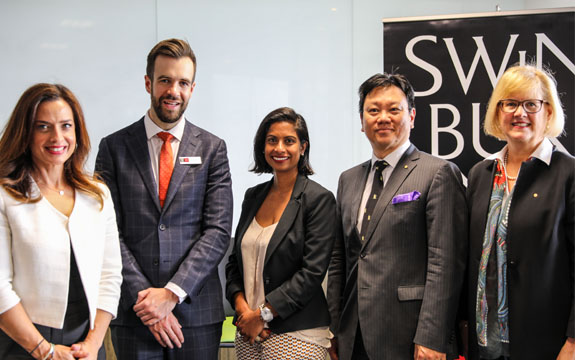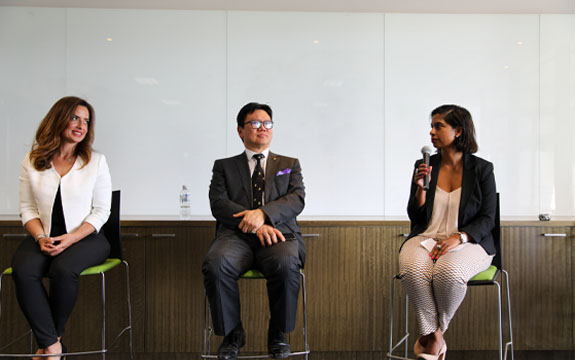Fostering cultural diversity, inclusiveness and belonging at Swinburne

In Summary
- Swinburne hosts ‘Cultural diversity at work’ panel to discuss practice and implementation of cultural diversity initiatives
- Panellists spoke about their personal experiences of overcoming the diversity barrier
- Swinburne has formal commitments in place and works closely with community leaders to strengthen cultural diversity across the university
Bringing together an esteemed panel, Swinburne’s ‘Cultural diversity at work’ discussion sparked dialogue around the importance of cultural diversity in the workplace and nurturing inclusive communities.
Sharing in the discussion on 10 October were panellists Founder and CEO of GlobalCQ, Ms Anoushka Gungadin; the first barrister of Malaysian-Chinese descent to be appointed senior counsel in Australia and Swinburne council member, Mr William Lye OAM QC; and Vice-Chancellor’s Fellow for Multicultural Engagement and former Chair of the Victorian Multicultural Commission Ms Helen Kapalos.
Panellists were selected for their deep knowledge and expertise in cultural diversity, but also their connection to the Swinburne community.

All eyes were on Founder and CEO of GlobalCQ, Ms Anoushka Gungadin, as she shared her personal experience with cultural diversity in the workplace.
Swinburne’s commitment to cultural diversity
Vice-Chancellor and President Professor Linda Kristjanson AO opened discussions, describing cultural diversity as “increasingly important, not only to Swinburne but to the wider community.”
“Our commitment to creating a diverse and inclusive community is something we have maintained and continue to strengthen,” Professor Kristjanson said.
“Swinburne has students and staff from more than 100 countries. This presents a wonderful opportunity and challenges us to be a place that optimises the contributions of all.”
Professor Kristjanson highlighted some of the many ways Swinburne is committed to cultural diversity, including through:
- A Charter of Cultural Diversity ensuring a whole-of-university approach to integrating cultural diversity values and practices
- The Migrant Aspiration Program which seeks to remove barriers to higher education and helps people who are new to Australia feel welcome and part of the Swinburne community
- Swinburne’s Welcome Scholarships giving refugees and asylum seekers the opportunity to achieve their education goals
- The World Kitchen event which celebrates cuisines from around the world
- The planting of a Migrant Welcome Tree at each of Swinburne’s campuses, symbolising new and emerging communities.
During discussions hosted by Swinburne’s Head of Government Relations and Senior Manager of Multicultural Engagement, Chris Hennessy, panellists shared their own personal experiences with cultural diversity, and discussed how the Swinburne community could better engage students, staff and researchers from all cultures and backgrounds.
“Conversations like these are the best way to promote good ideas and to share important experiences with our communities,” says

